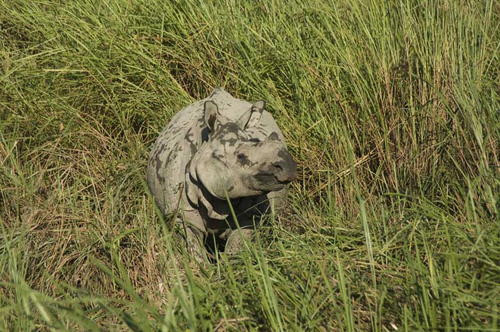Save The Rhino: India Using Drone Technology To Protect Endangered Wildlife From Poachers

Indian wildlife officials are employing remote-controlled aerial drones to save the endangered one-horned rhinoceroses in the northeastern province of Assam.
Officials at the Kaziranga National Park said the drones will aid them in monitoring parts of the park to protect the rhinos from poachers, who have already killed 16 animals in the first three months of this year, after slaughtering 22 last year.
The rhino horn is prized in China and parts of eastern Asia for its apparent medicinal properties and appeal as jewelry.
"This is an alarming situation," said Dipankar Ghose of the World Wide Fund for Nature, in a statement.
"The soaring demand for rhino horns in China and Vietnam is driving the slaughter."
Kaziranga, one of the few places left in eastern India untouched by human habitation and also a Unesco World Heritage Site, is home to an estimated 2,300 one-horned rhinos, or about two-thirds of the world’s population of the beast. The 330-square-mile park also boasts a large number of tigers and elephants.
N.K. Vasu, the chief of Kaziranga, called the first drone fight a "milestone in wildlife protection.”
"The Unmanned Aerial Vehicle (UAV) was up in the sky for 15 minutes. It landed safely," Vasu said. "We hope this technology will go a long way in effective surveillance of the park."
According to reports, the drones are small and light enough to be launched by hand and can reach an elevation of about 650 feet for up to 90 minutes. They can also take photographic images of the ground with an installed camera.
Such drones have already been used successfully against poachers in the Chitwan National Park in Nepal. But this is believed to be the first time such a device has been applied to protecting wildlife in India.
"The UAVs will deter poachers who will now have to reckon with surveillance from air as well as on ground," said Assam Forest Minister Rockybul Hussain.
Kaziranga is also arming its forest guards and rangers from the first time to deter poachers.
Sotybon Pegu, a forest ranger at Kaziranga, who recently killed two poachers, told the Wall Street Journal: "I'm not answerable to anyone [in protecting] the rhinos. I will not let anyone harm them.”
The rhino is considered a local symbol of pride for the Assamese, who also count on revenue from the 100,000 tourists who come to the park annually.
However, some civil rights activists worry that arming forest rangers will only lead to unnecessary bloodshed deep in the forests.
Over the past three years, Kaziranga officials said 13 alleged poachers were killed. It is not clear if all the dead were actually poachers or not.
"It is totally illegal and unconstitutional," said Kirity Roy, a member of the civil-rights organization Banglar Manabadhikar Suraksha Mancha (Masum), in neighboring West Bengal.
© Copyright IBTimes 2024. All rights reserved.




















